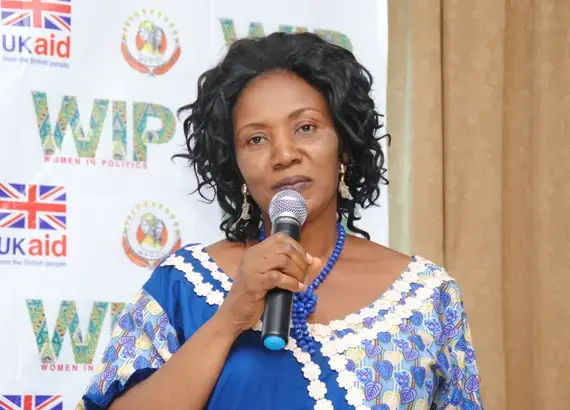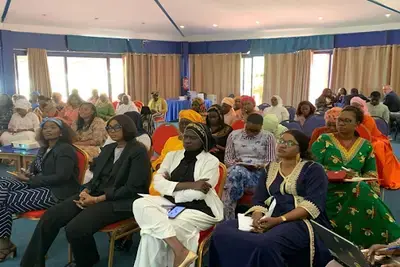
Ebe Joy, the ruling party's Enugu state chairman, speaks at NDI's Women in Politics program launch in Enugu.
Success Story
Women MPs and Journalists Confront Gender Stereotypes in Nigerian Politics
A widespread perception among Nigerians is that a vote for a woman is wasted as she cannot win or should not lead—a perception that hampers women from rising in the ranks within parties and from winning elected office. These negative stereotypes about women's political participation exist partly because the information sources that Nigerians trust most, like community leaders or journalists, do not challenge these views and instead negatively portray women in public life.
Through consultation under the Institute’s DFID-funded Women in Politics (WiP) program, women legislators shared with NDI their frustrations over frequently being misquoted after interviews, disproportionate coverage compared to their male counterparts and misrepresentation by partisan media outlets. Partnering with BBC Media Action, NDI laid the foundation to build a working relationship between elected women and the media. On February 23 and 24, NDI and BBC Media Action organized a two-day media relations capacity building session for eight women legislators from Anambra, Enugu and Adamawa states. Having journalists attend the seminar created more symbiotic relationships between the media and legislators.
Honorable Beverly Nkemdichie, Anambra State House of Assembly representative of Onitsha South II constituency, shares how NDI's training has improved her effectiveness as a legislator.
NDI reached out to Seun Okinbaloye, political correspondent for Channels Television and host of the program Politics Today, to participate in the capacity-building session. NDI leveraged Okinbaloye’s starpower to draw the general public’s attention to the issue of misrepresentation of elected women in the Nigerian media, in particular on Channels TV. Okinbaloye used his expertise to introduce strategies to the elected women for how they can work with and actually embrace the media in order to make town hall meetings more interactive for their constituents. Through role play exercises, women legislators got a feel for handling media inquiries and interview questions and learned how to present themselves in front of reporters. These training sessions are a part of a broader strategy to assist the women legislators in becoming more proficient in their legislative duties, particularly with better constituency engagement.
After the seminar, the legislators and journalists had not only a better understanding of the each other’s professional objectives and roles, but an improved working relationship moving forward. After being introduced to the obstacles women politicians endure on a daily basis, attending journalists committed to featuring women legislators more prominently and positively on their radio and television programs.
Exit meetings showed that this was the first time women legislators had received extensive training on how to engage with local media. One of the participants, the Honorable Lydia Omeje, reflected how her past reluctance to interact with the media was most likely due to her lack of personal experience, limited formal training and general apprehension. Afterward, however, Hon. Omeje felt that the two-day seminar had significantly boosted her confidence to engage the media, convey a compelling and tailored message and be portrayed as a skilled professional. In fact, since the training, Hon. Omeje spoke on two radio shows on Lion FM and Voice FM of Enugu state. In the coming months, NDI and BBC Media Action are looking forward to building on the initial progress made at the seminar by continuing to work with elected women and journalists to better represent in the media the contributions of women in politics.



